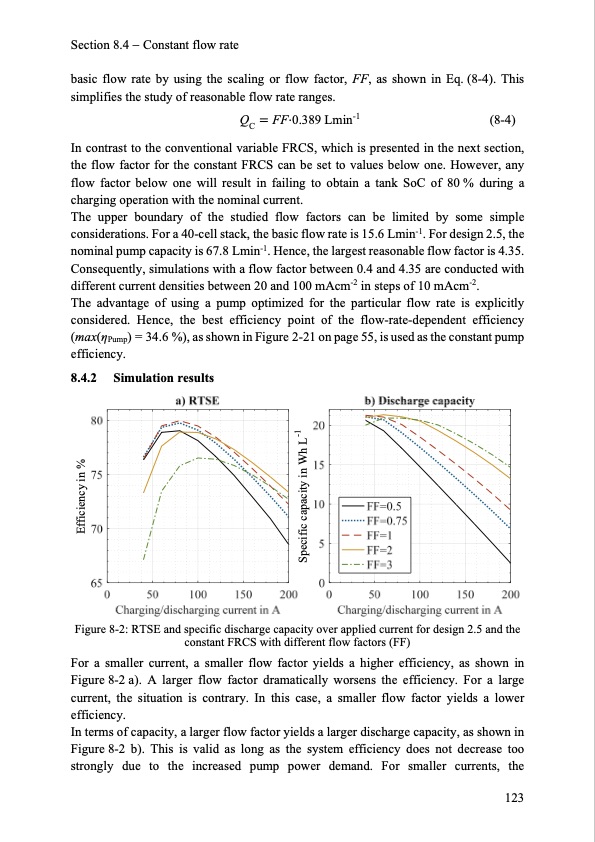
PDF Publication Title:
Text from PDF Page: 131
Section 8.4 Constant flow rate basic flow rate by using the scaling or flow factor, FF, as shown in Eq. (8-4). This simplifies the study of reasonable flow rate ranges. QC FF⋅0.389 Lmin-1 (8-4) In contrast to the conventional variable FRCS, which is presented in the next section, the flow factor for the constant FRCS can be set to values below one. However, any flow factor below one will result in failing to obtain a tank SoC of 80 % during a charging operation with the nominal current. The upper boundary of the studied flow factors can be limited by some simple considerations. For a 40-cell stack, the basic flow rate is 15.6 Lmin-1. For design 2.5, the nominal pump capacity is 67.8 Lmin-1. Hence, the largest reasonable flow factor is 4.35. Consequently, simulations with a flow factor between 0.4 and 4.35 are conducted with different current densities between 20 and 100 mAcm-2 in steps of 10 mAcm-2. The advantage of using a pump optimized for the particular flow rate is explicitly considered. Hence, the best efficiency point of the flow-rate-dependent efficiency (max(ηPump) = 34.6 %), as shown in Figure 2-21 on page 55, is used as the constant pump efficiency. 8.4.2 Simulation results Figure 8-2: RTSE and specific discharge capacity over applied current for design 2.5 and the constant FRCS with different flow factors (FF) For a smaller current, a smaller flow factor yields a higher efficiency, as shown in Figure 8-2 a). A larger flow factor dramatically worsens the efficiency. For a large current, the situation is contrary. In this case, a smaller flow factor yields a lower efficiency. In terms of capacity, a larger flow factor yields a larger discharge capacity, as shown in Figure 8-2 b). This is valid as long as the system efficiency does not decrease too strongly due to the increased pump power demand. For smaller currents, the 123 Efficiency in % Specific capacity in Wh L-1PDF Image | Model-based Design Vanadium Redox Flow Batteries

PDF Search Title:
Model-based Design Vanadium Redox Flow BatteriesOriginal File Name Searched:
10-5445IR1000070670.pdfDIY PDF Search: Google It | Yahoo | Bing
Salgenx Redox Flow Battery Technology: Salt water flow battery technology with low cost and great energy density that can be used for power storage and thermal storage. Let us de-risk your production using our license. Our aqueous flow battery is less cost than Tesla Megapack and available faster. Redox flow battery. No membrane needed like with Vanadium, or Bromine. Salgenx flow battery
| CONTACT TEL: 608-238-6001 Email: greg@salgenx.com | RSS | AMP |